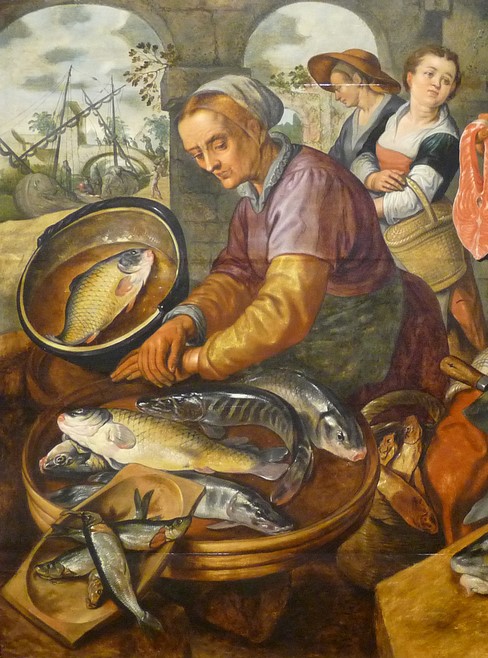
The fishwives of London were a staple of public life in the late medieval period and well into the Early Modern era. Many women who worked, whether widows, femme soles, or wives were often hucksters or street vendors. Fishwives were often married to fishmongers or inherited the trade. Their presence on the streets of London and in Billingsgate, a prominent port on the Thames, made them infamous among the various hucksters. Female street vendors, especially fishwives transgressed gender roles with their labor. To attract attention and customers, fishwives often yelled, hollered, developing an unsavory reputation among Londoners and England as a whole. Not only were these women loud, but their trade caused many to be associated with the odor of raw fish. Fishwives embodied attributes that were the antithesis of femininity in the Medieval period - loud, smelly, and unapologetic.
While many fishwives were married to male fishmongers, they did not enjoy the same status nor respect as their male counterparts. For example, male fishmongers were permitted to sell in markets while female fishmongers were forbidden, forcing them to sell on the street. This inequality coupled with the behavior and reputation of fishwives harmed their perception in London. Many fishwives sold their products at Billingsgate, a port that became synonymous with fishwives.
Law and punishment in the Medieval period are infamous for their cruelty and absurdity. While women did not have autonomy or agency like their male peers, they still could be accused and punished for crimes. Social attitudes toward women and their labor affected their punishment. Women even had their own pillory, called a thewe, that was similar except their legs were not separated. Female laborers of all kinds had different regulations and laws to contend with, and fishwives were no exception. In 1372 Margery Hore, a fishwife of London was accused of knowingly selling rotten fish “in deceit of the common people.” After being questioned by the mayor and aldermen, Hore did not deny the charges and was sentenced to the thewe while her rotten fish burned and her punishment proclaimed for all to hear. While Hore deceived the public, her punishment reflects the impact of the social stigma toward fishwives. A necessary fixture of the street and Billingsgate, fishwives also represented the unseemingly “male” attributes women should never possess. Also, because these women were loud and worked the street, they were associated with prostitutes. Hore’s punishment is indicative of how law and punishment were used to cement social norms, especially with women’s labor.
Women’s labor in Medieval London challenged gender norms as some women became bosses or transgressed behavior norms in public. Fishwives and prostitutes experienced this arguably more than other labor fields of the era. The actions, behavior, and smell of fishwives pushed them physically and socially to the outer limits of public labor in London. Despite being mocked in plays and literature, fishwives continued to labor throughout the Medival era and into the Early Modern period.






